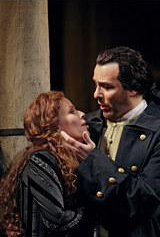Rodelinda was the spearhead of the Handel revival, and that point is as sharp as ever. Remembered for 200 years (if remembered at all) as series of arias beautiful in themselves but dramatically inert, this piece and Handel operas in general awoke in the early 1920's, thrived in German opera houses and have since spread to the kind of luxurious production the Metropolitan Opera gave it last season and revived on Tuesday night.
Some parts have changed hands but with no loss of quality. Doing Handel well at the Met requires convincing personalities, athletic agility and enough vocal power to reach out to a house of almost 4,000 seats. Listening, for example, to Stephanie Blythe (Eduige) or John Relyea (Garibaldo) reminded one of new generations of sports figures somehow genetically engineered to project size without clumsiness and finesse without fragility.
Handel worked in a style we might have called psychological drama. Singers don't do much; instead, they think and feel, either directing their agendas toward one another or as asides to the audience. Arias begin, do something different in their center and then repeat what they started with, not unlike a Cole Porter song. Without visible signs of plot advancement to help them along, newer audiences have tended to fidget.
The Met's splendid evening on Tuesday explained much. I have nothing but admiration for Stephen Wadsworth's handling of Baroque opera's ''nothing much happens'' style of theater. He avoided the awkward poses or make-work gyrations of ''non-combatants'' onstage during the singer of the moment's long expostulations. Colleagues pay attention to colleagues, and with a dignity and sincerity that implies action we don't quite see.
Handel's music is treated for what it is: a fiery collection of character studies and roller-coaster emotional rides. Musically, individual numbers walk in circles, but Mr Wadsworth encourages a communal sensibility that takes action forward. Vertical opera, in other words, is given a horizontal effect.
Thomas Lynch's handsome sliding sets put Rodelinda roughly in Handel's own 18th century and in a sunny Mediterranean world of tile roofs and cypress trees. Wifely fidelity is the theme. Rodelinda (Renée Fleming), a queen thought to be widowed, finds herself pursued by suitors who want her throne.
With a little gentle cribbing from Homer and the Greeks, her husband, Bertarido (Andreas Scholl), returns undercover, and all (except the evil Garibaldo, who ends up dead) are restored to civility. Four hours of opera pass swiftly.
Mr Scholl's convincing presence and excellent countertenor voice received a loud and long reception on Tuesday. Ms Blythe and Mr Relyea sang the darker-sounding parts with power and clarity. Kobie van Rensburg returned as Grimoaldo and with the kind of agile, penetrating tenor that suits Handel in big opera houses. Christophe Dumaux, a first-rate countertenor, sang the role of Unulfo.
Ms Fleming's Act II duet with Mr. Scholl was a thing of beauty. She also sang affectingly in up-tempo arias. Given too much space and time to interpret, she tends to overload her performances with hesitating accents, surges of tone and other vocal ticks. The audience seemed to love them all, and I'm sure with reason. After some uncertain ensemble at the start, the Met orchestra did well by the conducting of Patrick Summers, who also played harpsichord continuo parts.

